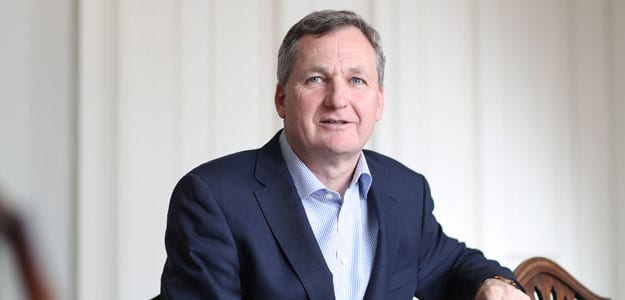In our next CEO Q&A, Cathal Friel, CEO of Open Orphan, tells Business and Finance about how personal experience has made him “hungry to keep moving forward to be successful”.
My main goal is to turn around Venn Life Sciences in the coming months, to make it profitable as soon as possible. Venn is a small clinical research company, with eight years of existence, with no real profits and some serious losses. I also want to build the Open Orphan business as quickly and effectively as possible. Being able to get existing Venn staff to understand they are working in a loss-making business and as such are not generating profits. There are only two ways a loss-making business can stop losing money: We are currently busy working on both. We have a small ‘critical’ core team, through which information sharing and a financially motivated success-based system is critical. Ensuring the direction the company is moving in and prospects align with staff is also motivating. While the pharma industry, like any industry, has challenges, I believe the opportunities outweigh these. It is one of the fastest growing and most profitable sectors in Ireland at present. Because the pharma industry has been hugely profitable there has been no real incentive to adopt new ideas or to embrace change because the status quo has always been fine. And as such the pharma industry has not involved the AI world nor has it embraced modern tech in many instances. We feel with Open Orphan, we are bringing the digital world to parts of the pharma business. And we are planning on building one of Europe’s largest rare disease patient genomic databases. We are doing this through the Open Orphan Digital health platform. Ireland is a fantastic place for pharma service business and we have found no problems in hiring or retaining staff, as there is a huge workforce already trained to a high degree in big pharma and who relish the idea of getting involved in a small company like ours. I have experienced economic ups and downs in a personal capacity. During the 1981 recession, when interest rates shot through the roof and due to my father’s overexposure to property debts in 1980, I had to leave school as a 15-year-old after my Inter Cert and help him deal with chronic bad health and banking debts. As such, for the rest of my life, I have hated bank debt. While running my own business in 2007, I entered the banking and economic crisis with virtually no debts except for a modest house mortgage. The success of the Irish economic model over the past 50 years has in a large part been driven by inbound Foreign Directed Investment (FDI), primarily from North America. With the advent of the European tax rules, I am convinced that FDI into Ireland would decrease in the years ahead because North American companies would have automatically chosen the UK over Ireland if our tax rates were the same. Coupled with this is America, which is increasingly focused on retaining investment as a result of a more ‘inward’ focus. Therefore, I believe Brexit presents opportunities for Ireland. With the advent of Brexit (whether hard or soft) no FDI is going to choose Britain over Ireland when locating in Europe. There has been half a dozen FDI related deals into Ireland in the last 18 months with each of them in at least tens of millions. Furthermore, in the last ten years, Chinese FDI to Europe has come to the UK, due to the UK/Chinese relationship. However, it is wonderful to see an unusually large amount of Chinese FDI arriving in Ireland in recent months. Namely, UXI Pharma setting up a pharma plant in Dundalk and Wuxi Nextcode sending a huge sum of money acquiring Genomic Medicine Ireland. I am convinced that Brexit has been great for bringing FDI to Ireland. Furthermore, Irish business and employers have been able to use it as a “bogey man” and a big stick to keep the trade unions’ demands under control. After the great recession, Ireland was one of the least competitive places in Europe to do business. However, given all the cutbacks, Ireland today has regained its competitiveness within Europe and has been a pretty good place to do business. I define success as achieving your goals no matter how large or how small, being happy and acting as a person that people respect and look up to and whom parents of young children may say “become like that person”. What drives me is the memory, hurt and anger from virtually losing everything as a 15-year old teenager in Donegal, practically giving up my schooling to help bail out my father. That experience has made me very hungry to keep moving forward to be successful. And despite leaving school at 15, I still managed to go back to college at night to get a Master’s degree, to become probably the only lecturer in Ireland without a Leaving Cert or A level. And along the way paid off my family debt and built successful businesses. Stay hungry, work hard, be nice to people and embrace change. My highlights have been the completion of the IPO of Open Orphan plc. This is now my third company I have helped put together and listed on both the London and Dublin stock markets. I’m particularly proud and excited that Amryt PLC, a company I helped co-found which we IPO in May 2006 is about to relist in the coming months on the London stock exchanges with an enterprise value approaching half a billion. To be seen as a successful creator of small public companies. Business life is full of changes and I love changes as they bring opportunity and I think there are too many opportunities to list at this point in time.Q. What are your main priorities and goals in your role?
Q. What are your biggest challenges as CEO?
Q. How do you keep your team/staff motivated?
Q. What are the challenges facing the industry?
Q. What new trends are emerging in your industry?
Q. As an employer are you finding any skill gaps in the market?
Q. How did your strategy develop in the context of the banking crisis and economic crisis?
Q. How will Brexit affect you, or have you started to feel the effects already?
Q. How do you define success and what drives you to succeed?
Q. What’s the best advice you’ve been given, or would give, in business?
Q. What have been your highlights in business over the past year?
Q. Where do you want your business/brand to be this time next year?
Q. Are there any major changes you would like to see in your sector?







